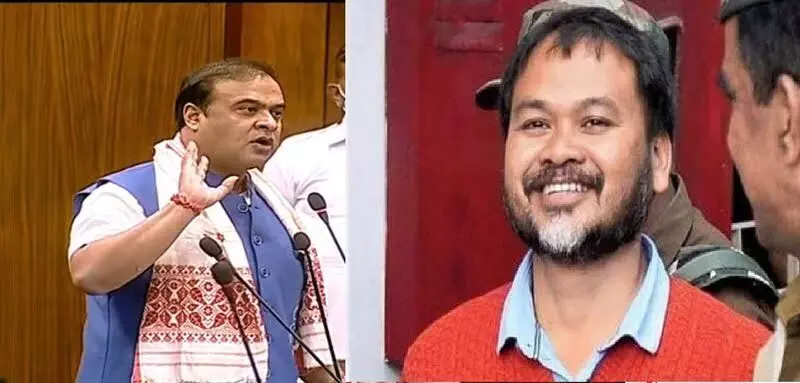Akhil Gogoi: Assam’s V.P. Singh — A Tragic Hero in the Age of Himanta Biswa Sarma

In the grand theatre of Indian politics, every generation produces its tragic hero — a man who dares to challenge the entrenched order, rises as the conscience of the masses, and yet is brought down by his own contradictions and the machinations of shrewder players.
For India, Vishwanath Pratap Singh was such a figure: a king who struck at the heart of privilege, unleashed forces of social justice through the Mandal Commission, but was consumed by the chaos he set in motion and by his own rigidity.
For Assam, that mantle belongs to Akhil Gogoi — a wildfire of moral outrage who roared against injustice, but today lingers as a shadow of the figure he once was. His tragedy is not his alone. It is also the story of Assam’s fractured politics, its shifting aspirations, and the ascendancy of a more ruthless tactician — Himanta Biswa Sarma — who rewrote the script to his advantage.
The Rise: From Peasant Leader to People’s Hero
Akhil Gogoi burst onto Assam’s political stage not as a politician, but as a crusader. A son of the soil armed with little more than the Right to Information Act and his own indomitable spirit, he exposed corruption in the Public Distribution System, fought against land grabs, rallied peasants, and blocked destructive dams.
In the turbulent decade when ULFA’s insurgency cast its shadow over Assam, Akhil emerged as a democratic counterpoint to violent rebellion — a radical who wielded not the gun but the microphone, who channelled anger without spilling blood. In him, many Assamese saw a reflection of their own frustrations: angry yet hopeful, rebellious yet rooted.
His charisma was undeniable. He could summon 30,000 people to a rally in an hour; his oratory rivalled the electricity of cultural icons like Zubeen Garg and Papon. His alliances extended beyond Assam — he marched alongside Kiran Bedi, stood with Arvind Kejriwal in the India Against Corruption movement, and drew inspiration from Baba Amte. The Indian Institute of Management even recognised him with an alumni award — a rare honour for a grassroots agitator.
At his peak, Akhil seemed poised to translate his moral authority into political power. Rahul Gandhi himself reportedly sought him out, hoping to fold him into the Congress and rejuvenate the party’s fading connection with Assamese youth and the minority Ali vote bank. Akhil, after all, fit the image Congress craved: a fiery yet democratic radical, an Assamese youth icon who could counter both ULFA extremism and BJP communalism.
But like V.P. Singh, Akhil rejected the embrace of the establishment. He chose to remain untamed — a decision both principled and fatal.
The Turning Point: The Lone Crusader in Dispur
Though the political platform Akhil Gogoi represented was called Raijor Dal — the People’s Front — in practice it remained little more than a loose organisation around his personality. In the 2021 Assembly election, he contested from Sibsagar LAC and won — a solitary voice sent from the people to the power corridors of Dispur.That lone victory marked a decisive turning point in his career.
For years he had been the mighty lion of Assam’s streets, roaring against injustice and shaking the establishment. But in the Assembly — stripped of crowds and surrounded by seasoned politicians — his roar dwindled to a meek mouse’s squeak. He cut an increasingly lonely figure: a solitary crusader with no organisational heft behind him, unable to move beyond symbolic gestures.
The Rise of Himanta: The Hunter and the Hunted
But Akhil’s tragedy cannot be understood without the rise of Himanta Biswa Sarma — the hunter in this political drama.
If Akhil was the roar of the streets, Himanta was the whisper in the corridors of power. If Akhil burned with righteous fire, Himanta flowed like water — cold, calculating, adaptable.
Himanta’s genius lay in his ability to convert agitation into power, where Akhil remained a professional rebel without a roadmap. When Himanta broke from Congress, he not only carried the organisational machinery and Assamese Hindu base with him but also began systematically neutralising threats like Akhil.
At the heart of this strategy was the Ali (Muslim) vote bank — long held by Congress, partly courted by AIUDF, and briefly within Akhil’s reach because of his pro-peasant, anti-establishment appeal. But while Akhil failed to build a sustainable base among minorities, Himanta redefined the Muslim question entirely — splitting the Ali vote between indigenous Assamese Muslims and Bengali-origin Muslims, creating a wedge that weakened both Congress and radicals like Akhil.
Where Congress and Akhil treated the minority vote as a moral constituency to be served, Himanta treated it as an equation to be solved — and he solved it ruthlessly.
The Tragedy: The Cage and the Conscience
In the end, Akhil Gogoi stands as Assam’s V.P. Singh — a man who shook the system but failed to master it, who inspired a generation but alienated his allies, who remains morally relevant yet politically sidelined.
His story is not merely a personal failure but a reflection of the limits of idealism in the face of realpolitik. Himanta Biswa Sarma exposed those limits ruthlessly, turning Akhil’s roar into a whimper and his rebellion into a cautionary tale.
Though he sits in the Assembly today as a lone crusader from Raijor Dal, he remains caged by his own miscalculations and the statecraft of his adversaries. From a mighty lion of the streets to a meek mouse in the Assembly — his arc is both inspiring and heartbreaking.
Epilogue: The Final Act?
Once a wildfire, now a captive flame.Once a lion, now a lonely figure.Yet even ghosts haunt.
Perhaps someday, when Assam needs to hear that roar again, Akhil Gogoi will find his stage.Until then, the curtain belongs to Himanta — the hunter who caged the beast.
